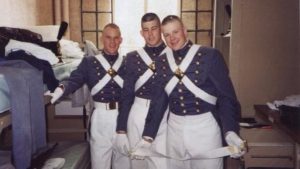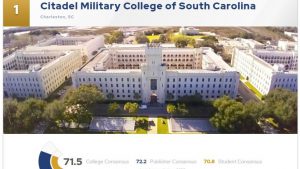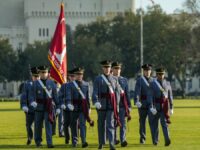
Professionals looking to advance their military careers or pursue work in international relations, law, or business can get practical training at The Citadel’s International Politics and Military Affairs graduate program.
Sarah Tenney Sharman, associate professor in the political science department, says The Citadel’s program is unique in that it’s a policy-oriented master’s program designed for students who want to seek careers as practitioners.
Established in 2016, this program was driven by the needs of students looking for higher level education to accommodate their schedules. Traditional graduate programs can be challenging for military officers, in particular, as they are frequently deployed around the world.
The International Politics and Military Affairs graduate program offers three benefits:
- Maximum flexibility for military personnel and working professionals. Students can opt to take courses in person, online, or some combination of the two.
- A nuts-and-bolts approach geared toward building skills needed by those who want to work in the field.
- Faculty practitioners with extensive experience working with the U.S. Army, the U.S. Department of Defense, and international agencies.
Tenney Sharman says many students go on to work for government agencies, such as the U.S. Department of State or intergovernmental agencies like the World Bank or American Red Cross. Others pursue careers in international business.
“Every major international bank or multinational company has a department of international politics with specialists who gain entry into countries and do risk assessments,” she says.
International law, especially maritime law, is a growing field in need of those trained in international politics, Tenney Sharman explains. Other students go into military intelligence or work for defense agencies.
The options for graduates of The Citadel’s program are almost limitless. “It’s a huge field,” Tenney Sharman says. “There are literally 40,000 international organizations in the world.”
To equip students with the tools they need for international politics, The Citadel program focuses on teaching key concepts and theory, the history of the field, and diplomacy, Tenney Sharman explains. Instructors emphasize communication skills – writing, critical thinking, and research.
“You have to have the ability to put your hands on reliable, complete information quickly,” she says. “You have to gather, synthesize, analyze, and convey information under the pressure of time.”
As international issues like those related to North Korea and Syria continue to dominate the headlines, it generates more interest in international politics, Tenney Sharman says.
“Globalization brings people together, people are traveling more, and there are worries about immigration and travel bans,” she says. “I think people are becoming more aware of the fact that the United States is the greatest nation, but we’re just one of 195 countries. We’re feeling the need to work with others.”
Learn more about The Citadel’s International Politics and Military Affairs Program.

 The Citadel’s online programs now ranked among top 5 in America in two categories
The Citadel’s online programs now ranked among top 5 in America in two categories A goal is a dream put into action
A goal is a dream put into action The Citadel ranks as best online college in the state
The Citadel ranks as best online college in the state

